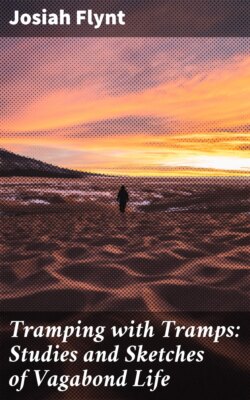Читать книгу Tramping with Tramps: Studies and Sketches of Vagabond Life - Flynt Josiah - Страница 16
На сайте Литреса книга снята с продажи.
ОглавлениеI wonder whether there are still men in Hoboland who remember that interesting little fellow called "the Cheyenne Baby"? Surely there are some who have not forgotten his grotesque vocabulary, and his utterly overpowering way of using it. There are different stories concerning his origin, and they vary in truthfulness, I have heard, as one travels southward from the Northern Pacific to Santa Fé. I give the one told in Colorado. It may be only a "ghost-story," and it may be true; all that I know is that it is not impossible. According to its teaching, his mother was once respectable and belonged to the politest society in the Indian Territory. When quite a young girl she carelessly fell in love with a handsome Indian chief, and, much to the disgust of her friends, married him and went away into his camp. It must have been a wild life that she led there, for within a year she was separated from him and living with another Indian. It is the same pitiful story for the next five years; she was knocked about from tent to tent and camp to camp. Her enemies say that she liked that kind of life, but her friends know better, and claim that she was ashamed to go home. However it was, she went over to the cow-boys after a while, and it was then that the baby was born, and she met the man, whoever he was, that introduced her into Hoboland. She appeared one night at a hang-out near Denver, and there was something so peculiarly forlorn about her that the men took pity on her and pressed her to stay. This she did, and for some time traveled with the hoboes throughout the districts lying between Cheyenne and Santa Fé. The boy became a sort of "mascot," and was probably the only child in Hoboland who was ever taught to be really good. The mother had stipulated with the men that they should never teach him anything bad, and the idea struck them as so comical that they fell in with it. Though they swore continually in his presence, they invariably gave him some respectable version of the conversation; and while about the only words he knew were curses, he was made to believe they signified the nicest things in the world. He died just as unknowing as he had lived, but it was a cruel death. He and his mother, together with some companions, were caught one night in a wreck on the Union Pacific, and all that the survivors could find of him to bury was his right arm. But that was bravely honored, and, unless the coyotes have torn down the wooden slab, the grave can still be found on the prairies.
I cannot leave this division of my theme without saying something about that large army of unfathered children who, to my mind, are just as much born on the road as the less known types. True, many of them are handed over at birth to some family to support, but the great majority of these families are not one whit better than the ambulanters. They train the orphans put into their care, in sin and crime, quite as carefully as the hobo does his beggar boy. These are the children who make up the main body of the class I have been considering, and it seems to me that they increase from year to year. At present the only legitimate career for them is that of the outcast, and into it they go. Few, indeed, succeed in gaining a foothold in polite society. Their little lives form the border-land of my second class, the children driven to the road.
